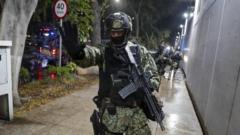The violent power struggle between rival factions within the Sinaloa cartel has led to a troubling increase in disappearances, with official reports indicating more than 200 individuals have gone missing since the internal conflict began nearly three months ago. This turmoil follows the arrest of key cartel leader Ismael "El Mayo" Zambada in the United States, believed to have ignited a bloody feud between factions identified as "Los Mayos" and "Los Chapitos."
The rivalry has raised alarms in Mexico and abroad, particularly influencing the new administration of President Claudia Sheinbaum. Following her inauguration as the first female president of Mexico on October 1, Sheinbaum pledged a distinctive approach to dealing with drug trafficking and violence, stating there would be “no return to the irresponsible drug war.” However, persistent violence in Sinaloa is challenging that promise.
In efforts to regain control over the deteriorating security situation, Sheinbaum has dispatched her chief of security, Omar García Harfuch, to the region. The state has witnessed a dramatic rise in criminal activity, overshadowing the administration's initial focus. President Sheinbaum is now taking a hardline stance, announcing a "zero tolerance" policy toward violence and drug trafficking in her public statements.
In a significant move aimed at curbing such criminal activities, Mexican security forces have conducted what is reported to be the largest fentanyl seizure in the nation's history, confiscating a substantial quantity valued at approximately $394 million. García Harfuch highlighted the scale of the operation, revealing the confiscated fentanyl weighed over a tonne.
The crackdown comes amid mounting pressure from U.S. officials, including President-elect Donald Trump, who has previously threatened to impose tariffs on Mexican goods if drug trafficking—especially fentanyl—continues unabated. The rising disappearances in Sinaloa and the ensuing crackdown on drug trafficking may impact U.S.-Mexico relations as both nations face the complexities of addressing drug abuse and migration issues.
As the Mexican government balances the dual challenges of cartel violence and international expectations, it remains to be seen how effective their strategies will be in curbing the bloodshed and restoring security for the people of Sinaloa.



















